
Jeffrey Ross Hyman, known professionally as Joey Ramone, was an American singer, songwriter, and the lead vocalist and founding member of the punk rock band Ramones. Having co-founded the Ramones with Johnny Ramone and Dee Dee Ramone in 1974, his image, voice, and tenure with the Ramones made him a countercultural icon.. Initially the band's drummer, Joey switched to lead vocals after the group's formation. Appearing on all the band's releases, Joey and Johnny were the only original members who stayed with the Ramones until disbandment in 1996. He then embarked on a solo career before dying of lymphoma in 2001. His debut solo album Don't Worry About Me was released the following year.
Punk rock is a music genre that emerged in the mid-1970s. Rooted in 1950s rock and roll and 1960s garage rock, punk bands rejected the corporate nature of mainstream 1970s rock music. They typically produced short, fast-paced songs with hard-edged melodies and singing styles with stripped-down instrumentation. Lyricism in punk typically revolves around anti-establishment and anti-authoritarian themes. Punk embraces a DIY ethic; many bands self-produce recordings and distribute them through independent labels.

Television was an American rock band from New York City, most notably active in the 1970s. The group's most prominent lineup consisted of Tom Verlaine, Richard Lloyd (guitar), Billy Ficca (drums), and Fred Smith (bass). An early fixture of CBGB and the 1970s New York rock scene, the band is considered influential in the development of punk and alternative rock.

Richard Lloyd is an American guitarist and songwriter, best known as a founding member of the rock band Television.
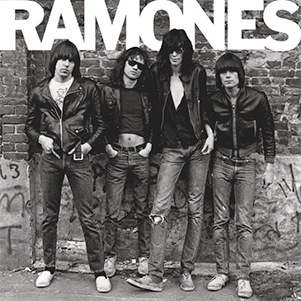
Ramones is the debut studio album by the American punk rock band Ramones, released on April 23, 1976, by Sire Records. After Hit Parader editor Lisa Robinson saw the band at a gig in New York City, she wrote several articles about the group and asked Danny Fields to be their manager. Fields agreed and convinced Craig Leon to produce Ramones, and the band recorded a demo for prospective record labels. Leon persuaded Sire president Seymour Stein to listen to the band perform, and he later offered the band a recording contract. The Ramones began recording in January 1976, needing only seven days and $6,400 to record the album.
The Dictators are an American rock band formed in New York City in 1973. Critic John Dougan said that they were "one of the finest and most influential proto-punk bands to walk the earth."

The Dead Boys are an American punk rock band from Cleveland, Ohio. The band was among the first wave of punk, and regarded by many as one of the rowdiest and most violent groups of the era. They were formed by vocalist Stiv Bators, rhythm guitarist Jimmy Zero, bassist Jeff Magnum, lead guitarist Cheetah Chrome, and drummer Johnny Blitz in 1975, with the later two having splintered from the band Rocket From The Tombs. The original Dead Boys released two studio albums, Young Loud and Snotty, and We Have Come for Your Children.

CBGB was a New York City music club opened in 1973 by Hilly Kristal in the East Village in Manhattan, New York City. The club was previously a biker bar and before that was a dive bar. The letters CBGB were for Country, Bluegrass, Blues, Kristal's original vision for the club. But CBGB soon emerged as a famed and iconic venue for punk rock and new wave bands, including the Ramones, Dead Boys, Television, Patti Smith Group, Blondie, Madonna and Talking Heads.

Steven John Bator, known professionally as Stiv Bator and later as Stiv Bators, was an American punk rock vocalist and guitarist from Youngstown, Ohio. He is best remembered for his bands Dead Boys and The Lords of the New Church.
Post-punk revival is a genre or movement of indie rock that emerged in the early 2000s as musicians started to play a stripped down and back-to-basics version of guitar rock inspired by the original sounds and aesthetics of post-punk, new wave and garage rock. It is closely associated with new wave revival and garage rock revival.
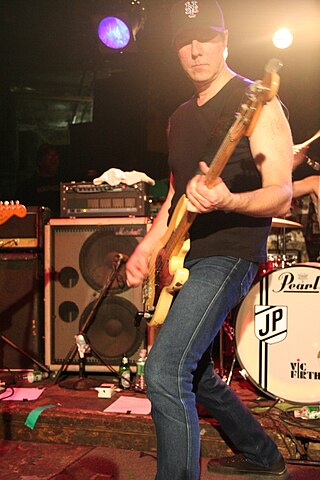
Andy Shernoff is an American musician, songwriter and record producer. He is a founding member of The Dictators, one of the original New York punk bands, in which he wrote nearly all of the songs, played bass guitar and keyboards, and sang backing vocals and occasional leads. He has been involved with a variety of other musical projects, most notably the heavily Dictators-populated Manitoba's Wild Kingdom and Joey Ramone's first studio album, Don't Worry About Me. He additionally co-wrote four Ramones songs with Joey.

Hillel Kristal was an American club owner, manager and musician who was the owner of the iconic New York City club CBGB, which opened in 1973 and closed in 2006 over a rent dispute.
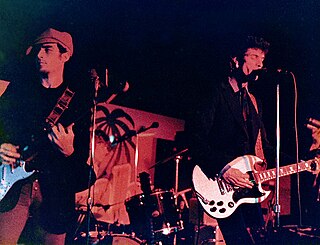
Mink DeVille was a rock band founded in 1974, known for its association with early punk rock bands at New York's CBGB nightclub and for being a showcase for the music of Willy DeVille. The band recorded six albums in the years 1977 to 1985, after which it disbanded the next year. Except for frontman Willy DeVille, the original members of the band played only on the first two albums. For the remaining albums and for tours, Willy DeVille assembled musicians to play under the name "Mink Deville". After 1985, when Willy DeVille began recording and touring under his own name, his backup bands were sometimes called "The Mink DeVille Band", an allusion to the earlier Mink Deville name.

Danny Fields is an American music manager, publicist, journalist, and author. As a music industry executive from the 1960s to the 1980s, he was one of the most influential figures in the history of punk rock. He signed and managed Iggy and the Stooges, signed the MC5 and managed the Ramones, and worked in various roles with Jim Morrison, the Velvet Underground and the Modern Lovers. In 2014 The New York Times said, "You could make a convincing case that without Danny Fields, punk rock would not have happened."
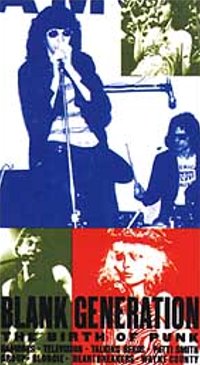
The Blank Generation (1976) is the earliest of the released DIY "home movies" of the 1970s punk rock scene in New York City. It was filmed by No Wave filmmaker Amos Poe and Patti Smith Group member Ivan Kral.
"Poison Heart" is a song by the punk rock band Ramones. Written by Dee Dee Ramone, who had retired as their longtime bassist in 1989 but still wrote songs for the band. "Poison Heart" was included on the 1992 album Mondo Bizarro and was also released as a single. The song was given to the band by Dee Dee in exchange for bailing him out of jail and has a slower tempo than typical Ramones songs.

The Ramones were an American punk rock band formed in the New York City neighborhood Forest Hills, Queens in 1974. Known for helping establish the punk movement in the United States and elsewhere, the Ramones are often cited as the first true punk rock band. Although they never achieved significant commercial success, the band is seen today as highly influential in punk culture.

Metropolis Video was a group of filmmakers and video makers who documented on video the early years of the punk rock music scene in New York City, from 1975 to 1977. They shot footage of numerous punk rock and new wave bands at CBGB, the downtown music club, which in 1975 had been open only two years.

CBGB is a 2013 American biographical drama film about the former New York music venue CBGB. It follows the story of Hilly Kristal's New York club from its concept as a venue for Country, Bluegrass and Blues (CBGB) to what it ultimately became: the birthplace of underground rock 'n' roll and punk. The film uses devices such as comic book-style panels, as well as onscreen text to identify important figures in the punk movement.
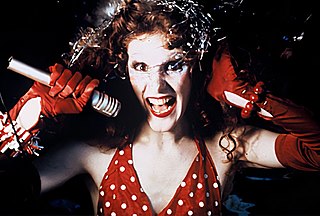
Ruby and the Rednecks is an American rock band from New York City, inspired by New York Dolls and created by the singer, songwriter, playwright and actress Ruby Lynn Reyner with collaborating musical artists in 1970 and active until today. The band was originally composed by Ruby Lynn Reyner, John Madera, George Basley (drums), Augie Sabini (saxophone), Bobby Kent (drums), Susan Lampert, and Danny Couse, but currently has a new formation. From the original group, only Lampert remains. Ruby wrote most of the lyrics herself. John Madera was praised as a guitar player.

















